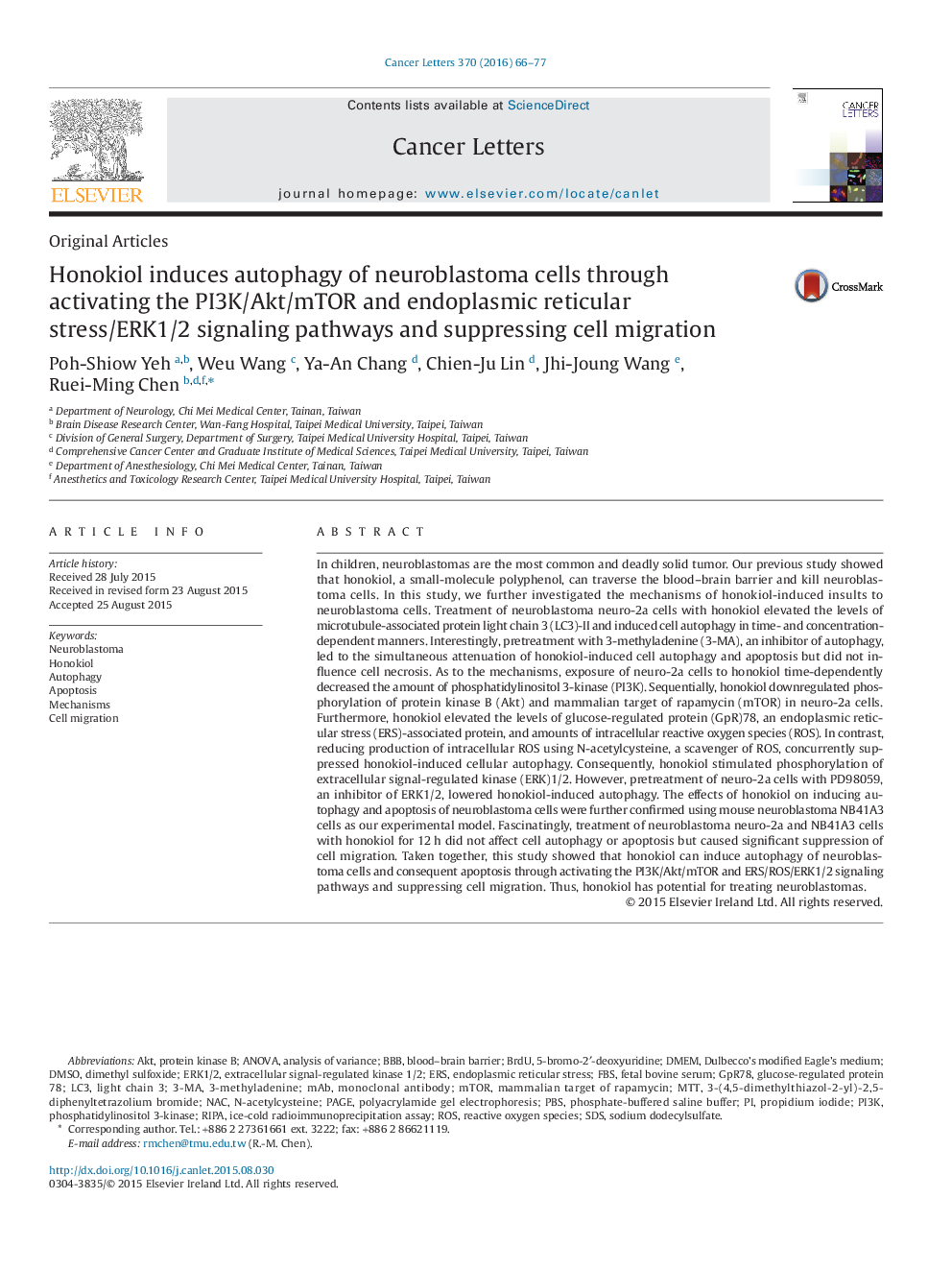| کد مقاله | کد نشریه | سال انتشار | مقاله انگلیسی | نسخه تمام متن |
|---|---|---|---|---|
| 2116132 | 1084709 | 2016 | 12 صفحه PDF | دانلود رایگان |

• Honokiol induces autophagy and resulting apoptosis of neuroblastoma cells.
• Honokiol triggers autophagy via activation of the PI3K/Akt/mTOR signaling pathway.
• Honokiol sequentially stimulates ER stress/ROS/ERK1/2 phosphorylation and then induces autophagy of neuroblastoma cells.
• Treatment with honokiol at a low concentration for a short-term interval can suppress cell migration.
In children, neuroblastomas are the most common and deadly solid tumor. Our previous study showed that honokiol, a small-molecule polyphenol, can traverse the blood–brain barrier and kill neuroblastoma cells. In this study, we further investigated the mechanisms of honokiol-induced insults to neuroblastoma cells. Treatment of neuroblastoma neuro-2a cells with honokiol elevated the levels of microtubule-associated protein light chain 3 (LC3)-II and induced cell autophagy in time- and concentration-dependent manners. Interestingly, pretreatment with 3-methyladenine (3-MA), an inhibitor of autophagy, led to the simultaneous attenuation of honokiol-induced cell autophagy and apoptosis but did not influence cell necrosis. As to the mechanisms, exposure of neuro-2a cells to honokiol time-dependently decreased the amount of phosphatidylinositol 3-kinase (PI3K). Sequentially, honokiol downregulated phosphorylation of protein kinase B (Akt) and mammalian target of rapamycin (mTOR) in neuro-2a cells. Furthermore, honokiol elevated the levels of glucose-regulated protein (GpR)78, an endoplasmic reticular stress (ERS)-associated protein, and amounts of intracellular reactive oxygen species (ROS). In contrast, reducing production of intracellular ROS using N-acetylcysteine, a scavenger of ROS, concurrently suppressed honokiol-induced cellular autophagy. Consequently, honokiol stimulated phosphorylation of extracellular signal-regulated kinase (ERK)1/2. However, pretreatment of neuro-2a cells with PD98059, an inhibitor of ERK1/2, lowered honokiol-induced autophagy. The effects of honokiol on inducing autophagy and apoptosis of neuroblastoma cells were further confirmed using mouse neuroblastoma NB41A3 cells as our experimental model. Fascinatingly, treatment of neuroblastoma neuro-2a and NB41A3 cells with honokiol for 12 h did not affect cell autophagy or apoptosis but caused significant suppression of cell migration. Taken together, this study showed that honokiol can induce autophagy of neuroblastoma cells and consequent apoptosis through activating the PI3K/Akt/mTOR and ERS/ROS/ERK1/2 signaling pathways and suppressing cell migration. Thus, honokiol has potential for treating neuroblastomas.
Journal: Cancer Letters - Volume 370, Issue 1, 1 January 2016, Pages 66–77